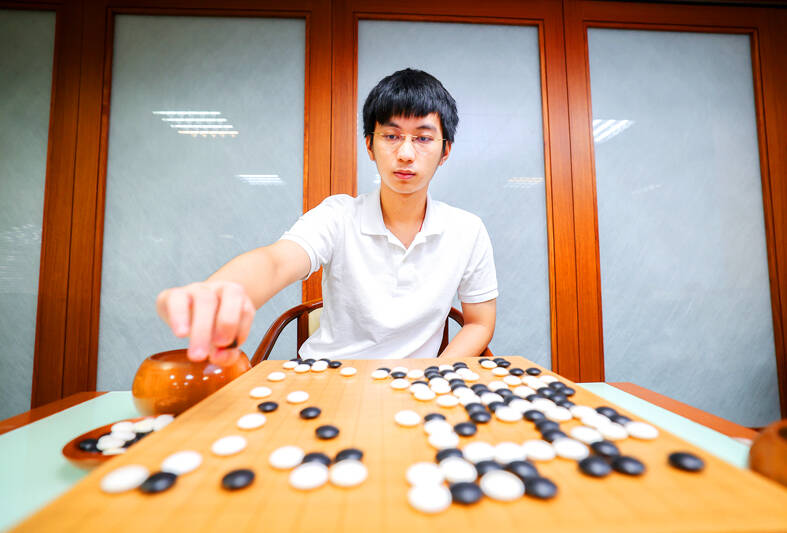Taiwan’s top go player, Hsu Hao-hung (許皓鋐), capped off last year in style by being awarded numerous bonuses at a Taipei award ceremony, bringing his annual income last year to more than NT$13 million (US$422,971).
Hsu was awarded a total of NT$3.6 million at the HaiFong Go Association ceremony for his success in the Hangzhou Asian Games.
Before the ceremony, Hsu had already pocketed more than NT$5.8 million in prize money, according to the Taiwan Chi Yuan Culture Foundation, as well as a NT$3 million payment from the Sports Administration and another NT$1 million from the chief executive officer of his father’s company — Taiwan Mask Corp — leading to him receive NT$13.4 million last year.

Photo: CNA
Siliconware Precision Industries Co chairman Bough Lin (林文伯), who chairs the HaiFong Go Association and chipped in NT$3 million to Hsu’s bonus, said that Hsu’s achievement meant he had “half fulfilled” his dreams and that “he now felt as though he could almost retire.”
The 72-year-old entrepreneur added that the cherry on top of the cake would be to see a Taiwanese go player win an international title.
Hsu said he would sponsor the King of Newcomers tournament this year to cultivate more upcoming go players.
He had announced his initial plan to fund the tournament in 2022 after winning eight of the nine major pro titles in Taiwan and bagging NT$8.5 million in prize money.
“I can do this because it is within my [financial] capability, but I would not ask other go players to do the same. The most ideal method would be to have enterprises sponsor tournaments,” said Hsu, who won six out of nine major titles last year.
Hsu called on Taiwanese go players to keep an eye on international tournaments and seize any opportunity to showcase the strength of players from Taiwan.
In addition to Hsu, the spotlight was also on Lai Jyun-fu (賴均輔), who won the Taiwan Meijin Go Tournament; Hsu Ching-en (徐靖恩), who won the Speed Go Championship; and Wang Yuan-jyun (王元均), who won the HaiFong Go Tournament.
Wang, who lifted the HaiFong tournament trophy as his first career title in 2013, said that a younger generation, led by Hsu Hao-hung, has been on the rise, and that last year could be key to that generation’s history.
However, veterans should look up to go players in South Korea, Wang said, adding that he hoped to make it to the podium for another decade.
“In the era of artificial intelligence go, I think both young and old players can be successful. The juniors are more energetic, but the seniors are more experienced,” he said.

The brilliant blue waters, thick foliage and bucolic atmosphere on this seemingly idyllic archipelago deep in the Pacific Ocean belie the key role it now plays in a titanic geopolitical struggle. Palau is again on the front line as China, and the US and its allies prepare their forces in an intensifying contest for control over the Asia-Pacific region. The democratic nation of just 17,000 people hosts US-controlled airstrips and soon-to-be-completed radar installations that the US military describes as “critical” to monitoring vast swathes of water and airspace. It is also a key piece of the second island chain, a string of

A magnitude 5.9 earthquake that struck about 33km off the coast of Hualien City was the "main shock" in a series of quakes in the area, with aftershocks expected over the next three days, the Central Weather Administration (CWA) said yesterday. Prior to the magnitude 5.9 quake shaking most of Taiwan at 6:53pm yesterday, six other earthquakes stronger than a magnitude of 4, starting with a magnitude 5.5 quake at 6:09pm, occurred in the area. CWA Seismological Center Director Wu Chien-fu (吳健富) confirmed that the quakes were all part of the same series and that the magnitude 5.5 temblor was

The Central Weather Administration has issued a heat alert for southeastern Taiwan, warning of temperatures as high as 36°C today, while alerting some coastal areas of strong winds later in the day. Kaohsiung’s Neimen District (內門) and Pingtung County’s Neipu Township (內埔) are under an orange heat alert, which warns of temperatures as high as 36°C for three consecutive days, the CWA said, citing southwest winds. The heat would also extend to Tainan’s Nansi (楠西) and Yujing (玉井) districts, as well as Pingtung’s Gaoshu (高樹), Yanpu (鹽埔) and Majia (瑪家) townships, it said, forecasting highs of up to 36°C in those areas

IN FULL SWING: Recall drives against lawmakers in Hualien, Taoyuan and Hsinchu have reached the second-stage threshold, the campaigners said Campaigners in a recall petition against Chinese Nationalist Party (KMT) Legislator Yen Kuan-heng (顏寬恒) in Taichung yesterday said their signature target is within sight, and that they need a big push to collect about 500 more signatures from locals to reach the second-stage threshold. Recall campaigns against KMT lawmakers Johnny Chiang (江啟臣), Yang Chiung-ying (楊瓊瓔) and Lo Ting-wei (羅廷瑋) are also close to the 10 percent threshold, and campaigners are mounting a final push this week. They need about 800 signatures against Chiang and about 2,000 against Yang. Campaigners seeking to recall Lo said they had reached the threshold figure over the